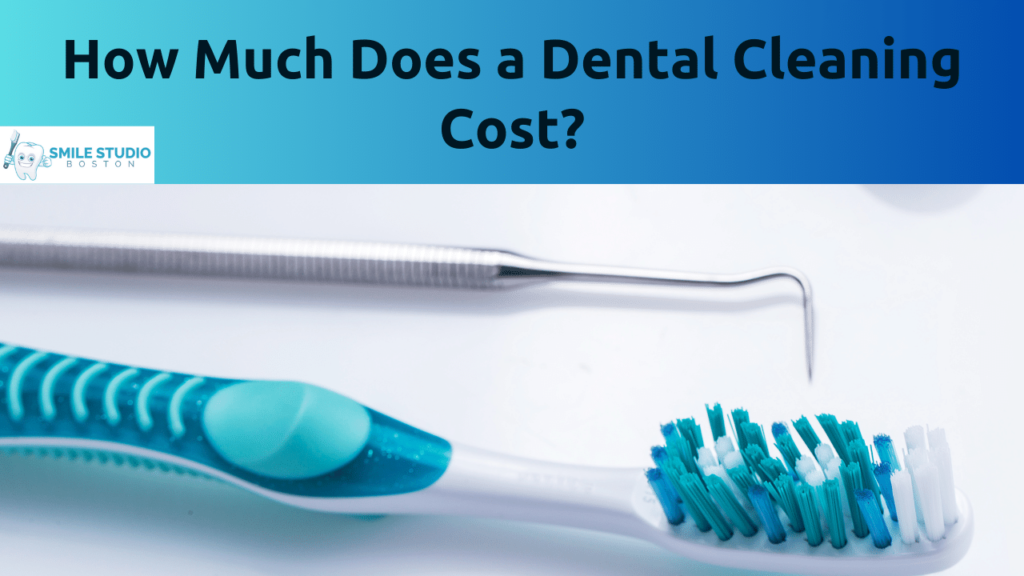Introduction
Dental cleaning is an essential part of maintaining optimal oral health. It involves the removal of plaque, tartar, and stains from your teeth, which cannot be achieved through regular brushing alone. By scheduling routine dental cleanings, you can keep your teeth and gums healthy, reduce the risk of gum disease, and maintain fresh breath. Dental problems such as gum disease and tooth decay can contribute to a number of health conditions, including heart disease and pneumonia. Therefore, understanding how much does a dental cleaning cost can help you budget for this important aspect of oral health care.
Also Read: Dental Ultrasonic Cleaners: Revolutionizing Oral Health Maintenance
What’s Included in the Dental Cleaning Costs
The total dental cleaning costs consist of several services to improve oral health and fight harmful bacteria. These essential services are also important in maintaining total body health. The bacteria in the mouth have been proven to be involved in heart diseases, respiratory diseases, Diabetes, Alzheimer’s disease, and more.
Your skillful dental hygienist will use a combination of ultrasonic and hand instruments to remove food, plaque, and bacteria from the tooth’s surface and gum pockets. Dental cleanings help prevent gum disease and cavities while keeping your teeth strong and healthy. The type of dental cleaning your mouth needs will influence the total dental cleaning costs. The several different types of dental cleanings are listed below:
1. Prophylaxis: This is a routine dental cleaning that is done every 6 months. Adult dental cleanings usually take around 45-60 minutes while children will only need around 30 minutes.
2. Full-Mouth Debridement: Without professional dental cleanings, plaque and bacteria will build up in the form of calculus (hardened plaque). This type of cleaning is done when there is too much bleeding and calculus to be removed at one time.
3. Fine Scaling: This is the follow-up appointment to a Full-Mouth Debridement and is similar to routine prophylaxis. It will remove any plaque and calculus left over after the gums have a chance to heal and expose what is left to be cleaned.
4. Scaling and Root Planing: Patients with gum disease and bone loss will need a more involved cleaning. A deep cleaning will remove the plaque, calculus, and bacteria above and below the gum line.
5. Perio Maintenance: After scaling and root planing, patients with gum disease will need more frequent cleanings. The destructive bacteria need to be stabilized every 3-4 months through maintenance cleanings.
Also Read: Understanding the Timeline: How Long Does a Dental Cleaning Take?
Factors That Affect Dental Cleaning Costs
Several variables can influence the cost of professional teeth cleanings. These include:
1. Location of the Dentist or Dental Hygienist: The cost of dental procedures, like any service, can vary by region. In cities, expect higher teeth cleaning costs due to more operational expenses and demand. However, rural clinics might offer competitive prices, reflecting the region’s lower costs.
2. State of Your Oral Health: The condition of your teeth and gums can affect the type of cleaning required and, consequently, the cost. More advanced cases require more time and specialized treatment.
3. Type of Cleaning Required: The type of dental cleaning you need will influence the cost. For example, a routine cleaning will cost less than a deep cleaning or periodontal maintenance.
4. Whether You Have Dental Insurance or Not: Dental insurance can significantly impact out-of-pocket costs. Insurance companies typically cover the cost of two teeth cleaning sessions per year for children and adults.
5. Whether You Need a Prescription Toothpaste or an At-Home Product from Your Dentist: If you require special dental products, this could add to the overall cost.
Also Read: Affordable Oral Care: Understanding How Much is a Dental Cleaning Without Insurance
How Much Does a Dental Cleaning Cost?
The average cost of a dental cleaning without insurance can range from $75 to $200 per visit¹. However, this amount may vary based on where you live, your dental care provider’s training, and whether you need additional services. According to an American Dental Association (ADA) survey of dental fees in 2022, the average cost of teeth cleanings without insurance ranges between $20 and $100. Here is a breakdown of the average costs for different types of dental cleanings:
- Child Teeth Cleaning: $15-$70
- Adult Teeth Cleaning: $20 to $104
- Deep Cleaning: $50 to $300
- Periodontal Maintenance: $30 to $160
It’s important to note that these are average costs and actual prices may vary depending on various factors.
Also Read: Revolutionize Oral Health with SmileStudio: Why Deep Dental Cleaning is Essential
How Much is Covered by Dental Insurance?
Dental insurance typically covers a significant portion of the cost of dental cleanings. Most dental insurance policies cover 100% of the cost of preventive services, which include routine cleanings. Basic services, such as fillings and non-surgical extractions, are usually covered at 80% to 100%, depending on the policy. Major services, which cover almost everything else, may have more exclusions³.
The average dental insurance policy with comprehensive coverage costs $47 a month, according to Forbes Advisor’s analysis. A preventive care plan costs an average of $26 a month. Factors that influence the cost of individual dental insurance include a plan’s coverage, the annual maximum, and the out-of-pocket costs like deductibles and coinsurance.
It’s important to understand what’s covered in your dental insurance so you can stay up to date on preventive care such as exams and cleanings. When shopping for insurance, you may see the term “dental benefits,” which is different from dental insurance. An insurance plan is meant to absorb risk (for instance, the risk that you’ll need to have a tooth pulled, or to get a root canal), and it covers costs accordingly. A benefits plan covers some things in full, but other things only partially, and others not at all². It’s meant to be helpful, but it’s not a catch-all.
Also Read: How Does Invisalign Work? Your Comprehensive Guide with SmileStudio
Why You Should Get Regular Cleanings
Regular dental cleanings serve as a preventive measure, a routine check-up for your mouth where potential issues can be detected and addressed early. These sessions are not just about keeping your teeth shiny; they are comprehensive health checks that play a crucial role in maintaining your overall oral health. Professional dental cleaning is a meticulous process that goes beyond your daily brushing and flossing routine. It involves the removal of dental plaque and tartar, substances that can accumulate on your teeth over time and lead to oral diseases. Regular cleanings ensure that these harmful substances are kept at bay, reducing the risk of cavities and gum disease.
Getting your teeth professionally cleaned at least once or twice a year at a dental office can help to remove plaque and tartar, prevent gum disease and cavities, and remove stains. Professional teeth cleaning is an important step in maintaining your oral health. The benefits of a dental cleaning start with cleaner teeth. Your home toothbrush cannot remove tartar from your teeth. Therefore, even if you have the most state-of-the-art electric toothbrush, you will still need professional cleanings to get your teeth as clean as possible.
How to Save Money on Teeth Cleanings
There are several strategies to reduce the cost of dental cleanings:
1. Dental Insurance: Review your plan to understand what portion of dental cleaning costs are covered or consider enrolling in a plan. Dental insurance plans often cover the cost of cleanings, which are typically more affordable than major dental procedures.
2. Payment Plans: Many dentists offer payment plans to spread the cost over time. This can make dental care more affordable, especially for larger families or those with tight budgets.
3. Dental Discount Plans: These plans can offer reduced fees for various dental procedures. They are a good option for those without dental insurance.
4. Regular Cleanings: Scheduling regular cleanings, as recommended by your dentist, can help maintain oral health and prevent the need for more extensive and costly procedures. Regular cleanings can help prevent cavities and gum disease, and can save you money in the long run by avoiding more costly dental procedures.
5. Free and Low-Cost Clinics: Some community health centers offer free or low-cost dental cleanings. These clinics are often staffed by dental students supervised by experienced dentists.
Conclusion
The importance of regular dental cleanings cannot be overstated. They play a crucial role in maintaining oral health by effectively removing contaminants and microorganisms, substantially diminishing the risk of cross-contamination. Regular dental cleanings are part of the recommended regimen for healthy teeth and gums. While dentists typically recommend dental cleanings every six months, your provider may advise you to get cleanings more frequently if you have gum disease or other oral health conditions.
The cost of dental cleanings may vary based on several factors, including the location of the dental clinic, the complexity of the cleaning required, and the presence of dental insurance coverage. It is advisable to check with your dental insurance provider to understand the extent of coverage for preventive care services like dental cleanings. Many dental clinics also offer affordable dental plans or membership programs to help make dental cleanings more accessible.
We invite you to experience the SmileStudio difference. Our commitment to advanced technology, including Dental Ultrasonic Cleaners, ensures that we provide the safest and most effective dental care. Don’t compromise on your oral health. Schedule your dental cleaning with SmileStudio today and let us help you maintain a healthy and beautiful smile. We look forward to welcoming you to our SmileStudio family!

FAQs
1. How much is it to clean teeth at the dentist?
The cost of dental cleanings depends on the cleaning you need and whether you have a dental insurance plan. According to an American Dental Association (ADA) survey of dental fees in 2022, the average cost of teeth cleanings without insurance ranges between $20 and $100 Basic dental cleanings typically cost $75 to $200, while deep cleanings can range from $200 to $1,000 or more.
2. Is it worth getting your teeth cleaned at the dentist?
Yes, getting your teeth professionally cleaned is crucial for both your oral and general health. Regular dental cleanings can prevent more serious oral health complications like gum disease and dental cavities that can lead to tooth loss. Routine dental cleanings can prevent diseases in the rest of the body like heart disease, dementia, and complications of diabetes. So, it’s definitely worth getting your teeth cleaned at the dentist.
3. How much money is required to clean teeth?
The cost of dental cleanings depends on the type of cleaning you need and whether you have a dental insurance plan. According to an American Dental Association (ADA) survey of dental fees in 2022, the average cost of teeth cleanings without insurance ranges between $20 and $100. Basic dental cleanings typically cost $75 to $200, while deep cleanings can range from $200 to $1,000 or more.
4. Does teeth cleaning remove black stains?
Yes, teeth cleaning can help remove black stains. Dental hygienists use various tools, including ultrasonic cleaners, to remove tartar and polish off the tooth, leaving the surface free of black stains. Certain substances that you consume can cause tartar to take on a darker hue, such as coffee, red wine, other dark-colored drinks, sugary or starchy foods. Tobacco use, whether smoking or chewing, may seriously discolor teeth.
5. Is it painful to get teeth cleaned?
Teeth cleaning is typically a painless procedure because there is no cutting or injecting involved. However, some patients may experience pain or sensitivity, usually due to gum inflammation, tooth decay, and other symptoms of oral disease which can lead to increased sensitivity. These discomforts are usually temporary and subside within a few days.


